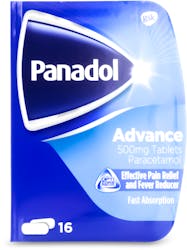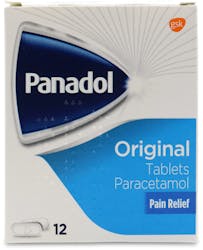Panadol Night Time Pain Relief 20 Tablets
Panadol Night Time Pain Relief 20 Tablets
What 500,000+ customers say about medino:
Description
Panadol Night Time Pain Relief 20 Tablets offer relief from night pain, promoting a deeper and more restful sleep. Tailored for adults grappling with disruptive pain like headaches or muscle aches, this product blends paracetamol and diphenhydramine to ease discomfort and encourage uninterrupted sleep.
Key features
- Dual-action formula combines pain relief with a gentle sleep aid.
- Fast-acting relief targets headaches, muscle aches, and other night pain.
- Wake up refreshed, ready to face the day.
- Trusted ingredients for safety and efficacy.
- Easy-to-take film-coated tablets for quick relief.
Is Panadol Night Time Pain Relief suitable for everyone?
This product is specifically formulated for adults and should not be administered to children. Individuals with known allergies to its components or underlying health concerns should consult a healthcare professional before use.
What sets Panadol Night Time Pain Relief apart from regular pain relief?
Unlike conventional painkillers that solely tackle pain symptoms, Panadol Night Time Pain Relief incorporates diphenhydramine to induce relaxation and improve sleep quality, ensuring a holistic approach to pain management.
Ingredients
Active ingredients:
Each tablet contains Paracetamol 500mg and Diphenhydramine Hydrochloride 25mg.
Other ingredients:
Maize starch, starch pre-gelatinised, potassium sorbate (E 202), povidone, purified talc, stearic acid, hypromellose (E 464), titanium dioxide (E 171), lactose monohydrate, macrogol 400, triacetin, brilliant blue FCF (E 133), indigo carmine (E 132) and carnauba wax.
Usage and Instructions
Adults (including the elderly) and children aged 16 years and over:
Two tablets to be taken 20 minutes before bedtime. Maximum daily dose: Two tablets (1000mg paracetamol, 50mg diphenhydramine hydrochloride) in 24 hours.
Other products containing paracetamol may be taken for daytime pain relief but at a reduced maximum dose of 6 tablets in 24 hours. The dose should not be repeated more frequently than every four hours.
Should not be used with other antihistamine-containing preparations, including those used on the skin
The lowest dose necessary to achieve efficacy should be used for the shortest duration of treatment.
Not recommended for children under 16 years of age except on medical advice.
Patients should not take the tablets for more than 7 consecutive nights without consulting their doctor.
Elderly: Should not be taken by elderly patients with confusion. Sedating antihistamines may cause confusion and paradoxical excitation in the elderly
Caution should be exercised in those with moderate to severe hepatic or renal impairment.
Warnings
Not recommended for children under 16 years of age except on medical advice.
Patients should not take the tablets for more than 7 consecutive nights without consulting their doctor.
Elderly: Should not be taken by elderly patients with confusion. Sedating antihistamines may cause confusion and paradoxical excitation in the elderly
Caution should be exercised in those with moderate to severe hepatic or renal impairment.
Avoid use of other antihistamine-containing preparations, including topical antihistamine and cough and cold medicines.
Avoid concurrent use with alcohol, as diphenhydramine may increase the sedative effects of alcohol. Therefore, alcohol should be avoided (see Interactions).
Medical advice should be sought before taking in patients with:
- Hepatic or renal impairment. Underlying liver disease increases the risk of paracetamol-related liver damage
- Glutathione depleted states as the use of paracetamol may increase the risk of metabolic acidosis
- Concurrent use of drugs which cause sedation such as tranquillizers, hypnotics and anxiolytics as diphenhydramine may cause an increase in sedative effects (see interactions).
Use with caution in:
- Patients with epilepsy or seizure disorders, myasthenia gravis, narrow-angle glaucoma, prostatic hypertrophy, urinary retention, asthma, bronchitis and chronic obstructive pulmonary disease (COPD), hepatic impairment and mild to moderate renal impairment.
- Patients taking monoamine oxidase inhibitors (MAOIs) or within 2 weeks of stopping an MAOI (see Interactions).
- Patients taking other drugs with antimuscarinic properties (e.g. atropine, tricyclic antidepressants (see Interactions).
Side Effects
Sedation, drowsiness, disturbance in attention, unsteadiness, dizziness, Dry mouth and fatigue








